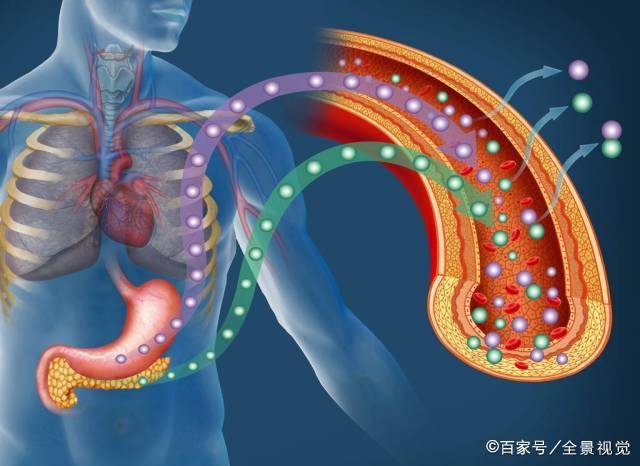Elderly have High Blood Sugar? Master a Few Eating Tips for More Stable Blood Sugar
The pancreas is a large and elongated gland resembling a bunch of grapes, it is the “valve” of human blood sugar. When blood sugar rises rapidly after meals, the pancreas secretes more insulin to control blood sugar and prevent it from exceeding the limit. While on an empty stomach, the pancreas also “rests”, secreting a small amount of insulin.
When the body is young, the pancreas functions strongly, even if we have irregular eating habits, often consume sweets and drinks, we can generally control blood sugar well. However, as the body ages into middle and old age, with the aging process, the pancreatic function will gradually weaken, leading to decreased ability to control blood sugar, making it prone to high blood sugar and even diabetes.
Next door neighbor, Mr. Wang, in his 60s, diagnosed with type 2 diabetes, needs to inject insulin before every meal to better control blood sugar, which has caused great inconvenience in his life.
Why is blood sugar often high after meals?
When eating, sugar substances enter the body and are quickly broken down into glucose, which is called blood sugar when it enters the bloodstream.
Deputy Chief Physician Luo Li of the Endocrinology Department at the First Affiliated Hospital of Anhui Medical University also mentioned:
Generally, 1 hour after a meal, blood sugar in the body will rise rapidly and will begin to gradually decrease around 2 hours, returning to normal levels approximately 3 hours after a meal.
Therefore, for some diabetic patients, especially, attention must be paid to preventing high blood sugar after meals. In situations where blood sugar rise can be anticipated, preventive measures should be taken in advance.
Elderly should Master a Few Eating Tips for More Stable Blood Sugar
1. Eat Small Meals Frequently
Normally, we have three meals a day. If the “three meals” are consumed regularly and in controlled portions, blood sugar can be maintained within a reasonable range. If this is not feasible, one can opt for four meals a day while reducing the amount of food per meal accordingly, keeping the total daily calorie intake constant. This reduces the intake of sugar substances per meal, ensuring that blood sugar recovers to normal levels more quickly after eating.
Try to avoid irregular meals or habits like skipping breakfast, skipping lunch, eating late-night snacks, or overeating.
2. Chew Slowly and Enjoy Each Bite
Eat slowly to make the most of saliva and thorough chewing, gradually releasing sugar substances and allowing blood sugar to rise slowly. This aids in achieving a feeling of fullness, extending meal times, stabilizing blood sugar, and preventing binge eating.
3. Avoid Sweets 30 Minutes Before and 2 Hours After a Meal
Avoid alcoholic beverages such as beer, spirits, red wine, cocktails, high-sugar drinks like sweetened soy milk, bean milk, carbonated drinks, candies, desserts, cream, etc., which are not conducive to blood sugar stability, before and after meals.
Three meals a day should sufficiently meet the body’s energy needs without indulging in high-calorie snacks; occasional snacks may include fruits or nuts.
4. For those with good gastrointestinal function, add more coarse grains and reduce refined grains intake
Refined grains usually refer to rice and pasta. Due to their high starch content and easy absorption, overeating can lead to drastic blood sugar fluctuations. For individuals with unstable blood sugar or who are overweight, reducing consumption is recommended.
Coarse grains include corn, millet, various beans, sweet potatoes, pumpkins, yams, lotus roots, potatoes, among others. These foods contain fiber that takes longer to release sugar substances in the body, thereby delaying the rise in blood sugar. Additionally, fiber-rich diets provide a sense of fullness and help restrict total calorie intake.
Since coarse grains may burden the gastrointestinal system of some elderly, those with good gastrointestinal function can consume more coarse grains or fresh vegetables. However, those with poor gastrointestinal health should moderate consumption to avoid affecting digestion and absorption.
Moreover, avoid refined preparation methods for coarse grains, and refrain from adding refined flour, sugar, or deep-fried components.
5. Include Some “White Meat” Foods
Proteins, fats, and sugars, the “three major” nutrients, all provide energy for the body. According to the “Chinese Residents’ Dietary Guidelines (2016),” daily energy intake should consist of 30% protein, 20% fat, and 50% sugars, which is most beneficial for overall health.
Therefore, individuals with unstable blood sugar should focus on protein intake to meet energy needs in conjunction with sugar substances, rather than relying solely on staple foods for energy provision. Among meat options, “white meat” is preferable, such as poultry, eggs, milk, fish, shellfish, which are high in protein and low in fat, promoting better health.
Besides maintaining a balanced diet, developing good sleeping habits (ideally sleeping before 10 p.m.), engaging in regular physical exercise or suitable labor activities, can effectively prevent obesity issues.
Furthermore, cultivating an optimistic mindset, regulating emotions, and avoiding negative thoughts due to high blood sugar are essential for promoting a positive approach to life, which is crucial in establishing healthy lifestyle habits.


